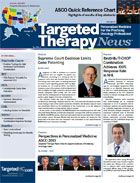Changing Landscape for Genetic Testing
The US Supreme Court’s unanimous ruling that an individual’s genes cannot be patented, together with Angelina Jolie’s announcement of her prophylactic double mastectomy, have focused much attention on cancer genetic testing.
Ellen T. Matloff
The US Supreme Court’s unanimous ruling that an individual’s genes cannot be patented, together with actress Angelina Jolie’s announcement of her prophylactic double mastectomy, have focused much attention on cancer genetic testing in recent weeks, leaving many to wonder what’s next in the burgeoning field of cancer genetics.
“The implications [of the Supreme Court ruling] are huge,” noted Certified Genetic Counselor Ellen T. Matloff, providing insights on the BRCA gene debate during a special presentation in New York City last month attended by physicians, genetic counselors, and the media. The event was hosted by Michael J. Hennessy Associates, Inc (MJH), parent company of OncLive and Targeted Healthcare Communications. Matloff, who directs the Yale Cancer Center Genetic Counseling Program, was one of the victorious plaintiffs in the Supreme Court case, arguing against the patenting of BRCA 1/2 genes by Myriad Genetics.
Rather than paying $4000 to be tested for two genes, Matloff said, it is likely that the next few years will see full exome sequencing of thousands of genes for less than $1000. This broadening of the marketplace for genetic testing will yield more targeted, sensible, and cost-effective medical decision-making. “Instead of offering every woman a mammogram at 40, we’ll know that some women will need a mammogram at 25, and perhaps others won’t need one until age 50.” She said the same will be true for other medical procedures, such as EKGs and colonoscopies.
Clinical Pearls
- Matloff forecasts real benefits to be realized from the more open marketplace emanating from the Court’s ruling
- Awareness of genetic testing has grown exponentially
While the cost of BRCA testing has remained an obstacle for many women, Matloff forecasts real benefits to be realized from the more open marketplace emanating from the Court’s ruling. She said that new testing companies emerged a mere 8 hours after the ruling was announced. “Now that these patents have fallen, everything is possible moving forward.”




















